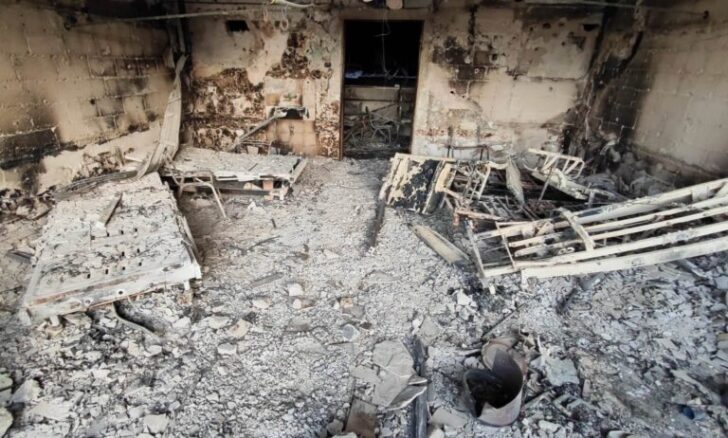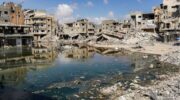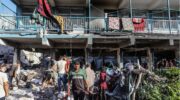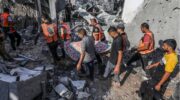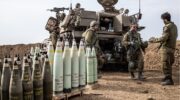During the massacre at al-Shifa Hospital, the Israeli army shot patients in their beds and doctors who refused to abandon the sick, separated people into groups with differently-colored bracelets, and executed hundreds of civil government employees.
by Tareq S. Hajjaj, reposted from Mondoweiss, April 11, 2024
Human heads eaten by crows, unidentified and decomposing body parts, and hundreds of corpses piled up and buried in mass graves are all that remained of the victims of the massacre at al-Shifa Hospital. The grim scene was something out of a dystopian movie, the product of the two-week siege of Gaza’s largest hospital that ended in its total destruction.
Following the completion of al-Shifa’s decimation, the Israeli army announced that it had been one of the most successful operations since the start of the war, claiming that it had arrested hundreds of Hamas and Palestinian Islamic Jihad members in the medical compound. But the question that no one seemed to ask is how such a massive number of so-called “operatives” from Hamas and PIJ had gathered at al-Shifa with the full knowledge that the place had already been combed by the army once before and that Gaza City had been occupied by the army ever since.
Mondoweiss contacted many survivors of the events at al-Shifa. Most of them refused to speak and feared exposing their identities. A few accepted under the condition of anonymity, fearing that their testimonies would make them targets by the Israeli army and that they would be subsequently killed. In light of the testimonies gathered by Mondoweiss, a different picture emerges of what happened.
The intelligence leak
One young man who managed to escape the hospital mere moments before the army invasion began said that there had indeed been hundreds of Hamas and Palestinian Islamic Jihad-affiliated employees in the hospital, but none of them were military operatives. They were workers in the Gaza government’s civil branch, including Civil Defense crews, the police force, the internal security services, interior ministry employees, and employees of other branches of the local government. All of them had gathered to receive their governmental salaries at al-Shifa, given that it was one of the few remaining places that was supposed to be relatively safe from the fighting.
“There was a room in the specialized surgeries building that served as an office for the government branches that operated aboveground,” said the young man, (hereafter named “Z”), referencing the Hamas government’s civilian branches.
Z also confirmed that a number of PIJ members who worked non-military jobs were there as well to receive salaries. “There was another building that was an office for the [PIJ] movement, and the men employed by the movement would go there to collect their salaries.”
“It had been a long time since any of these employees had seen one another,” Z explained. “That’s why they were all chatting in the medical compound and catching up with one another.”
The way the Israeli army described the gathering was that it had obtained confirmed intelligence reports of a large number of “terror operatives” from both groups inside al-Shifa, and after the raid, it announced that it had arrested 900 “suspects” and confirmed that 500 of them were “terror operatives,” while announcing that it had killed 200 more “gunmen,” among them “top commanders in Hamas and Palestinian Islamic Jihad.”
The siege begins
Z told Mondoweiss that he heard the sound of army vehicles and tanks approaching the hospital minutes before the attack. He and his colleague had also arrived at al-Shifa to receive their salaries.
“When we heard the vehicles, I told my colleague we had to leave immediately, thinking they might be headed toward the hospital itself,” Z said, explaining that anyone employed by the Hamas government is regarded as wanted by Israel. His colleague didn’t listen, believing that the army might be invading a nearby area instead. “He told me they were probably headed to the industrial zone.”
At first, Z’s colleague refused to leave, but as the sound of the tanks drew nearer, both decided to leave immediately. While they were both civilians with no military background, they were both members of the Hamas movement.
A few moments later, the invasion started. They witnessed the tanks surrounding the compound and the arrival of quadcopter drones hovering overhead. In an instant, all of al-Shifa was besieged from land and from air.
Another survivor who had managed to escape the compound said that the majority of intelligence regarding who had gathered at the compound was relayed to Israel by informants, collaborators, and undercover Israeli spies.
“On the night of the invasion, there were two street vendors who always sat at the entrance of al-Shifa,” the survivor told Mondoweiss. “One of them sold water, and the other sold canned foods. When the invasion happened, the two merchants revealed themselves to be soldiers. They took out handguns and entered the hospital with other soldiers, and they directed them where to go. They had been there for a long time and knew where everything was.”
The medical compound housed several buildings, including maternity wards, specialized surgery buildings, and cardiac wings. When the soldiers entered the compound, everyone was ordered to evacuate the buildings. Drones carrying speakers broadcast the army’s orders, telling people that they must exit and gather in the courtyard.
“The drones kept saying, ‘come out, you animals,’” Z told Mondoweiss.
Executions of doctors and suspected government employees
When everyone left the buildings, the army began to separate the crowds of people into groups, making each group wear differently-colored plastic bracelets. The soldiers told them that these bracelets were connected to a system that alerts snipers to their movements. They were divided into two colors: yellow, which was attached to hospital staff and whoever the army considered civilians, and red, which was given to people who could not move on their own, such as patients, the injured, amputees, or people with broken limbs.
The army also gathered people who were suspected of belonging to Hamas or the PIJ. They were not given bracelets but were separated from the injured and hospital staff, who were sent to a different building.
A third much larger group was ordered to leave the hospital entirely — thousands of displaced persons who had been sheltering in the compound, in addition to some members of the hospital staff. Some of the staff members, including doctors, refused to leave. When they refused the army’s orders, they were executed immediately and without argument.
The army then brought out a huge number of men from the group of suspected Hamas and PIJ members and employees, gathering them in the center of the courtyard. It then proceeded to execute them, one after the other. When the slaughter was done, army bulldozers piled up their corpses in the dozens, dragging them through the sand and burying them.
As this was ongoing, other soldiers stormed various buildings in the compound in search of people who had refused to evacuate when the initial order was given. They killed anyone they found, regarding them as suspects.
There were some in the hospital who resisted and attempted to open fire, including police officers carrying handguns. That number of people was minor, and their resistance did not save them — they were killed along with those who did not put up any resistance.
A video published on social media filmed by a journalist at the hospital shows a female doctor, who identified herself as Amira al-Safadi, describing what happened.
“After the first day of the attack, which we were surprised by at 2 a.m., the army ordered us not to leave when it entered,” Dr. Safadi says. “Then, on the second day, it gave us the bracelets and emphasized that we had to wear them and that anyone who left the building without wearing one would be immediately killed.”
“We were sent to four different buildings,” she continues, describing that she joined a number of other doctors and nurses with their patients. “Around 16 injured patients died because we were unable to treat them.”
By the time the army withdrew from al-Shifa, the entire compound had been all but decimated, reduced to rubble and burnt buildings.
One of ‘largest massacres in Palestinian history’
The Euro-Med Human Rights Monitor said that the massacre at al-Shifa was one of the largest in Palestinian history, estimating that at least 1,500 people had been killed, about half of whom were women and children. The organization also confirms that at least 22 patients were shot while in their hospital beds, while the number of displaced persons sheltering at the hospital who were forced to evacuate southward was estimated to include 25,000 people. Moreover, 1,200 housing units in the vicinity of al-Shifa were destroyed.
Despite the army’s claims about the al-Shifa operation’s strategic and military importance and the number of alleged Hamas and PIJ members it had arrested and killed, it overshadowed the intended purpose of the operation, which was to destroy the health system in northern Gaza and worsen the already disastrous humanitarian conditions. The entire compound is now unfit for use. Even the morgue, containing countless bodies of the slain, was burned down.
Israel’s “operation” at al-Shifa was, indeed, a success, and that success was to put Gaza’s largest hospital out of service.
Tareq S. Hajjaj is the Mondoweiss Gaza Correspondent, and a member of the Palestinian Writers Union. He studied English Literature at Al-Azhar University in Gaza. He started his career in journalism in 2015 working as a news writer and translator for the local newspaper, Donia al-Watan. He has reported for Elbadi, Middle East Eye, and Al Monitor. Follow him on Twitter at @Tareqshajjaj.
RELATED:
- Euro-Med report: Shifa Hospital witnesses one of the largest massacres in Palestinian history
- Israel Created ‘Kill Zones’ in Gaza. Anyone Who Crosses Into Them Is Shot
- Report: Israeli forces strip, rape pregnant Gazan woman in public
- Gaza’s chronically ill patients are out of medicine, doctors, and hope

